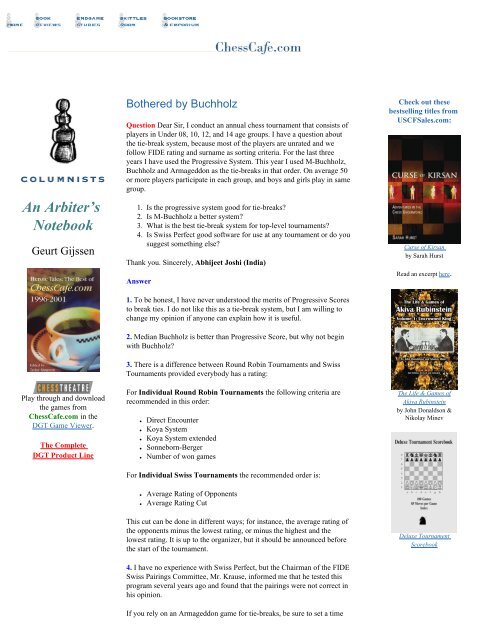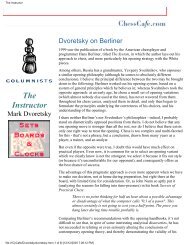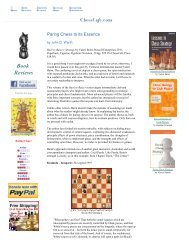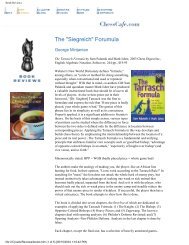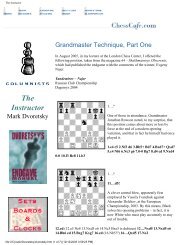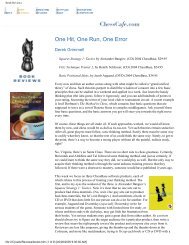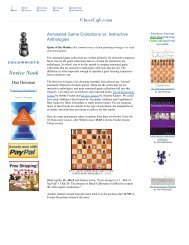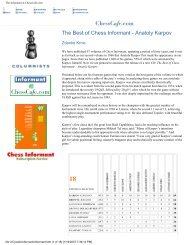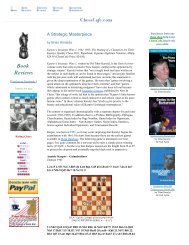An Arbiter's Notebook - Chess Cafe
An Arbiter's Notebook - Chess Cafe
An Arbiter's Notebook - Chess Cafe
You also want an ePaper? Increase the reach of your titles
YUMPU automatically turns print PDFs into web optimized ePapers that Google loves.
<strong>An</strong> Arbiter’s<br />
<strong>Notebook</strong><br />
Geurt Gijssen<br />
Play through and download<br />
the games from<br />
<strong>Chess</strong><strong>Cafe</strong>.com in the<br />
DGT Game Viewer.<br />
The Complete<br />
DGT Product Line<br />
Bothered by Buchholz<br />
Question Dear Sir, I conduct an annual chess tournament that consists of<br />
players in Under 08, 10, 12, and 14 age groups. I have a question about<br />
the tie-break system, because most of the players are unrated and we<br />
follow FIDE rating and surname as sorting criteria. For the last three<br />
years I have used the Progressive System. This year I used M-Buchholz,<br />
Buchholz and Armageddon as the tie-breaks in that order. On average 50<br />
or more players participate in each group, and boys and girls play in same<br />
group.<br />
1. Is the progressive system good for tie-breaks?<br />
2. Is M-Buchholz a better system?<br />
3. What is the best tie-break system for top-level tournaments?<br />
4. Is Swiss Perfect good software for use at any tournament or do you<br />
suggest something else?<br />
Thank you. Sincerely, Abhijeet Joshi (India)<br />
<strong>An</strong>swer<br />
1. To be honest, I have never understood the merits of Progressive Scores<br />
to break ties. I do not like this as a tie-break system, but I am willing to<br />
change my opinion if anyone can explain how it is useful.<br />
2. Median Buchholz is better than Progressive Score, but why not begin<br />
with Buchholz?<br />
3. There is a difference between Round Robin Tournaments and Swiss<br />
Tournaments provided everybody has a rating:<br />
For Individual Round Robin Tournaments the following criteria are<br />
recommended in this order:<br />
●<br />
●<br />
●<br />
●<br />
●<br />
Direct Encounter<br />
Koya System<br />
Koya System extended<br />
Sonneborn-Berger<br />
Number of won games<br />
For Individual Swiss Tournaments the recommended order is:<br />
Check out these<br />
bestselling titles from<br />
USCFSales.com:<br />
Curse of Kirsan<br />
by Sarah Hurst<br />
Read an excerpt here.<br />
The Life & Games of<br />
Akiva Rubinstein<br />
by John Donaldson &<br />
Nikolay Minev<br />
●<br />
●<br />
Average Rating of Opponents<br />
Average Rating Cut<br />
This cut can be done in different ways; for instance, the average rating of<br />
the opponents minus the lowest rating, or minus the highest and the<br />
lowest rating. It is up to the organizer, but it should be announced before<br />
the start of the tournament.<br />
Deluxe Tournament<br />
Scorebook<br />
4. I have no experience with Swiss Perfect, but the Chairman of the FIDE<br />
Swiss Pairings Committee, Mr. Krause, informed me that he tested this<br />
program several years ago and found that the pairings were not correct in<br />
his opinion.<br />
If you rely on an Armageddon game for tie-breaks, be sure to set a time
limit with an increment. There are too many problems when these games<br />
are played without increment.<br />
Question Dear Mr. Gijssen, I am writing about some issues with the<br />
Buchholz tiebreak. For years tournament announcements have included<br />
the “Buchholzwertung” for ranking purposes. Only recently did FIDE<br />
finally describe the Buchholz System, which is a great step forward.<br />
However, our German federation rules state that the FIDE rules are valid<br />
only after an authorized translation is published. Yet only the Laws of<br />
<strong>Chess</strong> are translated, not the FIDE tournament rules or whatever else is in<br />
the FIDE handbook. The rules are accepted as valid anyway, but there are<br />
many chief arbiters who simply do not understand them. So some<br />
clarification could help.<br />
Question 1: When you play an opponent who has won a round by<br />
default, you get his scores minus half a point. That is because his<br />
unplayed game counts as a draw. Is that correct?<br />
Question 2: Similarly, you would gain half a point for a loss by default.<br />
Is that correct? To put it another way, you get the opponent’s score from<br />
his played games plus half a point for each unplayed game.<br />
Question 3: If a player wins by default, this should – for tiebreak<br />
purposes – be counted as a draw against himself. He should therefore gain<br />
his own points (possibly adjusted by the rules above) as Buchholz. Is that<br />
correct?<br />
Question 4: Would it not make more sense (even if complicating matters)<br />
to reward him his own points he had before the win by default plus half a<br />
point for the win by default and each following round?<br />
Question 5: Wouldn’t his own points have to be adjusted in any case,<br />
because he certainly had an unplayed game?<br />
Question 6: Following the rules he would get the same Buchholz for a<br />
loss by default. Should he get any Buchholz at all?<br />
Question 7: The term “unplayed game” has caused confusion. The<br />
Preface of the Laws of <strong>Chess</strong> state “the game of chess is played between<br />
two opponents.” If one opponent is missing, there cannot be a game of<br />
chess. So how can there be unplayed games?<br />
Question 8: If a player drops out of a Swiss tournament, are their<br />
remaining rounds counted as “unplayed games”? For example, Player A<br />
wins his game against Player B in round one, and Player B then drops out.<br />
As the tournament is with 21 players and was set for 7 rounds, the<br />
remaining rounds were played with 10 games each and no bye awarded.<br />
Player B was not paired.<br />
Question 9: How many Buchholz would Player B “bring” Player A?<br />
Question 10: You mentioned last month (geurt126.pdf) that you would<br />
allow a player to enter a tournament in the second round, and you called<br />
his first round an unplayed game. Would you award him any Buchholz?<br />
Thanks for your time and your effort! Benjamin Dauth (Germany)<br />
<strong>An</strong>swer I think you understand how the system works. I can answer the<br />
majority of your questions with the following statement:<br />
For Buchholz scores the results 1-0 by forfeit, 0-1 by forfeit, 0-0<br />
by forfeit (because both players did not show up), bye (because<br />
an odd number of players), 0 (because the player left the<br />
tournament) 0 (because the player started in a later round the<br />
tournament) will be counted as ½-½.<br />
<strong>An</strong>swer 8: I think this may only be a question of semantics. I agree that<br />
two players are required to play a game, but consider the following<br />
Articles:<br />
6.7 <strong>An</strong>y player who arrives at the chessboard more than one hour<br />
after the scheduled start of the session shall lose the game unless the<br />
rules of the competition specify or the arbiter decides otherwise.<br />
11.1 Unless announced otherwise in advance, a player who wins his
game, or wins by forfeit, scores one point (1), a player who loses his<br />
game, or forfeits scores no points (0) and a player who draws his<br />
game scores a half point (½).<br />
If a player does not show up, he loses the game. For instance, if the player<br />
of the white pieces does not show up, then there is not even a move.<br />
Nevertheless, Article 6.7 points out that the game is lost for this player.<br />
Article 11.1 mentions that a player can lose or win by forfeit. There is no<br />
game. Nevertheless, a player can win or lose.<br />
Not mentioned in the Laws of <strong>Chess</strong> are the byes when there is no<br />
opponent available. This means that a player can score without playing a<br />
game.<br />
Question Dear Geurt, in a local tournament Player A (with the white<br />
pieces), made his move when the round started. His opponent (Player B)<br />
was not in the playing hall. Ten minutes later, Player A received a cellular<br />
phone call and the arbiter told Player A the he must lose the game<br />
because of this. However, the call was made by Player B to tell Player A<br />
that he would be late. Did the arbiter make the right decision by forfeiting<br />
Player A? Regards, Manuel López (México)<br />
<strong>An</strong>swer It is clear that Player A violated Article 12.2b:<br />
It is strictly forbidden to bring mobile phones or other electronic<br />
means of communication, not authorised by the arbiter, into the<br />
playing venue. If a player’s mobile phone rings in the playing venue<br />
during play, that player shall lose the game. The score of the<br />
opponent shall be determined by the arbiter.<br />
According to the Laws of <strong>Chess</strong>, Player A loses the game. If Player B<br />
arrives in time, he will receive a point. But is it a normal 1-0? I was told<br />
that FIDE considers it 1-0 by forfeit, because there is a result before the<br />
game began. The question remains: at which moment does a game begin?<br />
Last year in The Netherlands we had a case where both players were<br />
present in the playing hall at the start of the round, but one player refused<br />
to play. The arbiter declared the game won for his opponent. But it was<br />
thought that a game won in this way cannot be included for a norm. The<br />
arbiter contacted the FIDE rating officer and he informed the arbiter that<br />
the game cannot be rated, but can be included for a norm. A game can<br />
only be rated in case both players have made (completed?) at least one<br />
move. I will check in Dresden during the FIDE Congress as to whether<br />
this is correct or not. I will keep you informed.<br />
Question Dear Geurt Gijssen, I know how to apply the correct Buchholz<br />
calculation when using Swiss Perfect, but I cannot do the calculation<br />
myself to check when we have situations with withdrawals (WO) in the<br />
first round. Can you explain how to manually calculate the correct<br />
Buchholz? Regards, <strong>An</strong>tonio Mendonça (Brazil)<br />
<strong>An</strong>swer Unfortunately I could not use the file you attached, because I<br />
need all the individual results to make the calculations. But I will explain<br />
some tiebreak systems.<br />
The Buchholz score is the sum of the scores of each of the opponents<br />
of a player.<br />
Suppose a player participated in a Swiss tournament and he scored as<br />
shown in the table below.<br />
Table 1<br />
# opponents 1 5 8 14 21 28 39
esult of player #57 0 ½ 1 1 ½ ½ 0<br />
total score opponent 3½ 4½ 2 5 4 6 5½<br />
Example: Player #57 faced the players mentioned in the first line. In the<br />
second line the score of #57 against these opponents is listed, and in the<br />
third line you find the total scores of his opponents. The Buchholz score<br />
of player #57 is the sum of the scores: 3½ + 4½ + 2 + 5 + 4 + 6 + 5½ = 36.<br />
The Median Buchholz is the Buchholz score reduced by the highest<br />
and the lowest score of the opponents.<br />
In Table 1 we would have to reduce the scores of #8 (2 points) and #28 (6<br />
points). The Median Buchholz is in this case: 3½ + 4½ + 5 + 4 + 5½ =<br />
22½.<br />
The following is very important and also a little bit complicated:<br />
Independent of the result of an unplayed game (win by bye, win or<br />
loss by forfeit, no game because the player withdrew or was absent<br />
for (some) round(s)), for reasons of tiebreak, the result shall be<br />
counted as a draw against the player himself.<br />
Let us assume that in previous rounds there were two unplayed games: #5<br />
won a game by forfeit and #57 won his game against #8 because the latter<br />
did not show up. In this case the table will look like this:<br />
Table 2<br />
# opponents 1 5 8 14 21 28 39<br />
result of the player #57 0 ½ 1 1 ½ ½ 0<br />
total score opponent 3½ 4½ 2 5 4 6 5½<br />
The win of #5 against #16 will be considered as a draw against himself.<br />
Instead of 4½ his score for Buchholz calculations, and I repeat only for<br />
tiebreak calculations, will be 4. The same applies for the game #57 won<br />
by forfeit, but for the tiebreak calculations it will be counted as a draw.<br />
Thus, the table would be changed as follows:<br />
Table 3<br />
# opponents 1 5 (8) 14 21 28 39<br />
result of the player #57 0 ½ 1F 1 ½ ½ 0<br />
total score opponent 3½ 4 2½ 5 4 6 5½<br />
Explanation: #57’s score is 3½, but for our calculations we use only 3<br />
points. Instead of #8’s score (2 points) we use 2½ points for Buchholz<br />
calculations. For the same calculations we decrease the score of #5 with<br />
½ point and increase the score of #16 with ½ point. The Buchholz score<br />
of #57 will be: 3½ + 4 + 2½ + 5 + 4 + 6 + 5½ = 30½. The Sonneborn-<br />
Berger scores will be calculated in a similar way.<br />
Question Dear Geurt, playing with the black pieces I made the move 5…<br />
Qa5+, and only then noticed that my king was on d8 and queen on e8. I<br />
proposed to switch the pieces back to their correct position, but my<br />
opponent replied that they must remain where they are because we had<br />
gone past move three. (I understand that he noticed my queen and king<br />
were misplaced from the beginning, but he said nothing.) The arbiter then<br />
confirmed that the game must continue from that position, and
furthermore that I could not castle.<br />
Yet I was later informed that according to the FIDE rules (paragraph 8.5):<br />
If, during a game, it is found that the initial position of the pieces<br />
was incorrect, the game shall be annulled and a new game played.<br />
1. How did the chief arbiter and my opponent (who is also an arbiter)<br />
come to believe that the position was irreversible after three<br />
moves? Is this based on an old rule?<br />
2. According to FIDE rules can my opponent, who lost the game, now<br />
dispute the result?<br />
Many thanks, Pietro Monari (Italy)<br />
<strong>An</strong>swer I understand that you are confused. You correctly referred to<br />
Article 8.5, but this reference is only correct in case of a normal game. If<br />
it is a Blitz or Rapid game your opponent and the arbiter are right. For<br />
Rapid and Blitz games, Article B4 of the Laws of <strong>Chess</strong> is applicable:<br />
Once each player has completed three moves, no claim can be made<br />
regarding incorrect piece placement, orientation of the chessboard<br />
or clock setting. In case of reverse king and queen placement<br />
castling with this king is not allowed.<br />
Regarding your second question, provided it was a normal game, then you<br />
are the only person who has some moral right to claim a new game,<br />
because you are the player who had a disadvantage: you could not castle.<br />
Question Dear Mr Gijssen, what kind of assistance can a player use to<br />
calculate the final standings? For example, if I am playing the last game<br />
of the last round of a tournament and my opponent offers a draw – in<br />
order to decide whether to accept it or not, I must check the crosstable and<br />
standings, and calculate the Buchholz. Can I ask a friend? Or do the<br />
calculations myself with pen and paper? Can I use a calculator? A<br />
computer? The arbiter’s computer, where the Swiss program is running?<br />
What does the arbiter do if he sees this behaviour? Best regards,<br />
Christian Sánchez (Argentina)<br />
<strong>An</strong>swer The first Article that came to mind is Article 12.2a of the Laws<br />
of <strong>Chess</strong>:<br />
During play the players are forbidden to make use of any notes,<br />
sources of information, advice, or analyse on another chessboard.<br />
I understand that the advice you are asking about is different than the<br />
advice mentioned in Article 12.2a. What you are asking can be compared<br />
to the advice given by a team captain in a competition. The only<br />
difference that I can see between a round robin tournament and the<br />
calculations for a Swiss tournament is that the latter is much more<br />
complicated. If a player were to try and calculate the relevant Buchholz<br />
scores (without a calculator), I would not stop him, but I would inform<br />
him that it is almost impossible to do, especially when there are byes and/<br />
or unplayed games in the tournament. I would never allow a player to use<br />
my computer for such calculations. Suppose I made a mistake, then I<br />
would be responsible if he made a bad decision based on incorrect<br />
information.<br />
Question Dear Mr. Gijssen, during the third round of a Swiss System<br />
tournament, one pair of players played with the colors reversed. We<br />
noticed this just before the fourth round pairings. Should we then go back<br />
to the pairing program and reverse the color assigned to the pair before<br />
the fourth round is paired, or continue on as if nothing had happened? The<br />
latter choice would lead to violation of Swiss pairing principles; however,<br />
this would not be the arbiter’s fault. Is there consensus in counting the<br />
number of wins or wins with black in case the game is won by forfeit?
Thanks in advance. Best regards, Teerapong (Thailand)<br />
<strong>An</strong>swer Yes, before you pair the fourth round, you should return to the<br />
third round and swap the colors of this pair in your files, but the result<br />
stands. A game won by forfeit has no colors; therefore, you cannot count<br />
such a game as played with white or black by either player.<br />
Question Dear Mr Gijssen, I must disagree with your opinion regarding<br />
the provision of an assistant for blind (visually-handicapped) participants.<br />
Appendix F describes the powers that an assistant may exercise: they are<br />
not (by any stretch of the imagination) the same as the powers of an<br />
arbiter, nor indeed does such a person have to know the Laws of <strong>Chess</strong>,<br />
far less pass an examination of competence.<br />
The assistant’s role is solely to act as the instrument (acting as the “eyes”<br />
and, where necessary, the “arms”) of the handicapped player (nothing<br />
more, nothing less) in that game, and that game alone.<br />
Thus, I cannot see why you suggest that this person is in some way acting<br />
as an “assistant arbiter” (I also don’t recognize the term “assistant<br />
arbiter,” but that is another matter).<br />
Therefore, I suggest that the chain of argument fails. It is clearly the<br />
organizers’ responsibility to provide arbiters: I cannot see that it is the<br />
organiser’s responsibility to provide assistants, as indeed the Laws make<br />
clear. (In some jurisdictions, “equal opportunity” legislation may require<br />
organizers to provide assistants, but that is another matter).<br />
From a practical point of view, the player is often best placed to provide<br />
his own assistant. Where that is not possible, it is good practice (which I<br />
follow in my role as organizer) to appeal for volunteers to come forward<br />
to take this role. This is easier to arrange if advance notice is given.<br />
I can say that if it became enshrined in chess law that organizers had to<br />
provide assistants, then the probable consequence would be an exodus of<br />
organizers and the demise of tournaments. Kindest Regards, Trevor<br />
Davies (Scotland)<br />
<strong>An</strong>swer You are right that the assistant is not an arbiter. I was just so<br />
impressed by all the duties to be done by this assistant that I exaggerated<br />
when I wrote that he acts as an arbiter. I simply meant that he acts like an<br />
arbiter, not that he is an arbiter. I am aware that he is not an arbiter,<br />
especially when Article F9e is taken into account:<br />
…claim the game in cases where the time limit has been exceeded<br />
and inform the controller when the sighted player has touched one<br />
of his pieces.<br />
<strong>An</strong>d a controller is an arbiter.<br />
Have a question for Geurt Gijssen? Perhaps he will reply in his next<br />
<strong>Chess</strong><strong>Cafe</strong>.com column. Please include your name and country of<br />
residence.<br />
Yes, I have a question for Geurt!<br />
© 2008 Geurt Gijssen. All Rights Reserved.
[<strong>Chess</strong><strong>Cafe</strong> Home Page] [Book Review] [Columnists]<br />
[Endgame Study] [The Skittles Room] [Archives]<br />
[Links] [Online Bookstore] [About <strong>Chess</strong><strong>Cafe</strong>.com] [Contact Us]<br />
© 2008 Cyber<strong>Cafe</strong>s, LLC. All Rights Reserved.<br />
"<strong>Chess</strong><strong>Cafe</strong>.com®" is a registered trademark of Russell Enterprises, Inc.


